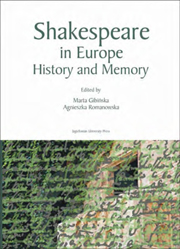Preface
Published online by Cambridge University Press: 05 September 2014
Summary
History and memory are concepts that raise many problems as soon as one tries to formulate any working definitions as starting points for research or the critical analysis of a text. Recent initiatives and innovations in historiography, philosophy, and history of ideas do not offer solid stepping stones; rather, they impel us towards very troubled seas. The traditional concept of history as a discipline that uncovers the truth of the past has long been undermined. Moreover, truth, as a general and objective state of our understanding of the past, is cancelled by the relativisation and subjectivisation of epistemology; even more, the past appears to possess an uncertain ontology of things that are not, which opens up numerous difficulties in formulating definitions of history and historiography.
The project under the title “Shakespeare in Europe: History and Memory,” launched in 2003, was meant to challenge scholars to approach the topic without giving any directions supplied by ready-made formulae. “History” was understood as a wide road leading to investigation of Shakespearean texts: there was no intention to narrow the field down to the history plays, or to specific concepts of time and space. “Memory” suggested the inevitable element of the personal, social, or national consciousness in the formation of the past narratives. The idea was to relate the plays as texts (printed or performed) to any context that would help to throw light on “things that are not” in order to demonstrate the time-bound changes that shape our understanding of “the truth” of the past, whether of the past created by the world of the play, or of past attitudes and ideas, political, aesthetic, or literary.
- Type
- Chapter
- Information
- Shakespeare in EuropeHistory and Memory, pp. 7 - 8Publisher: Jagiellonian University PressPrint publication year: 2008

